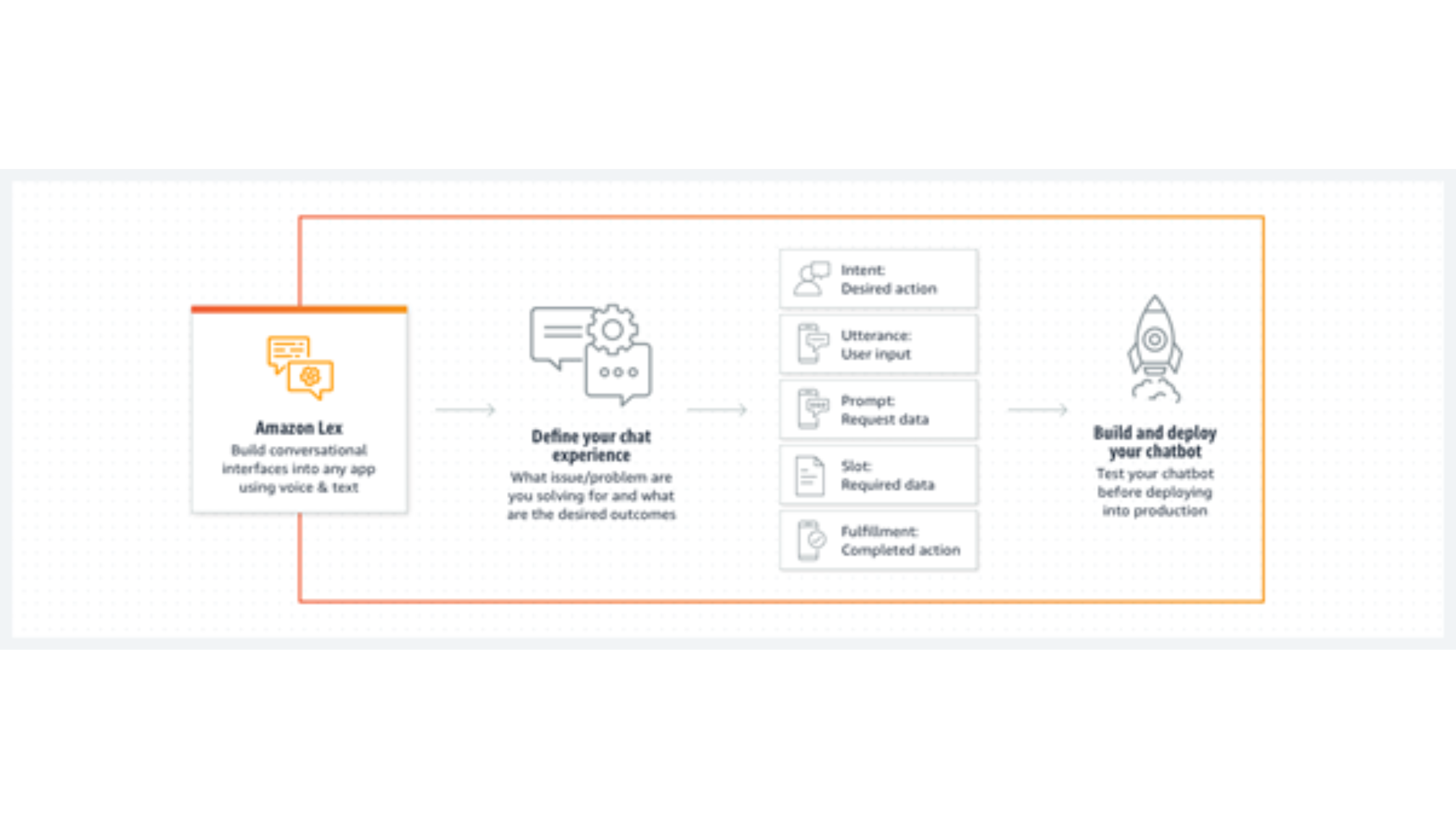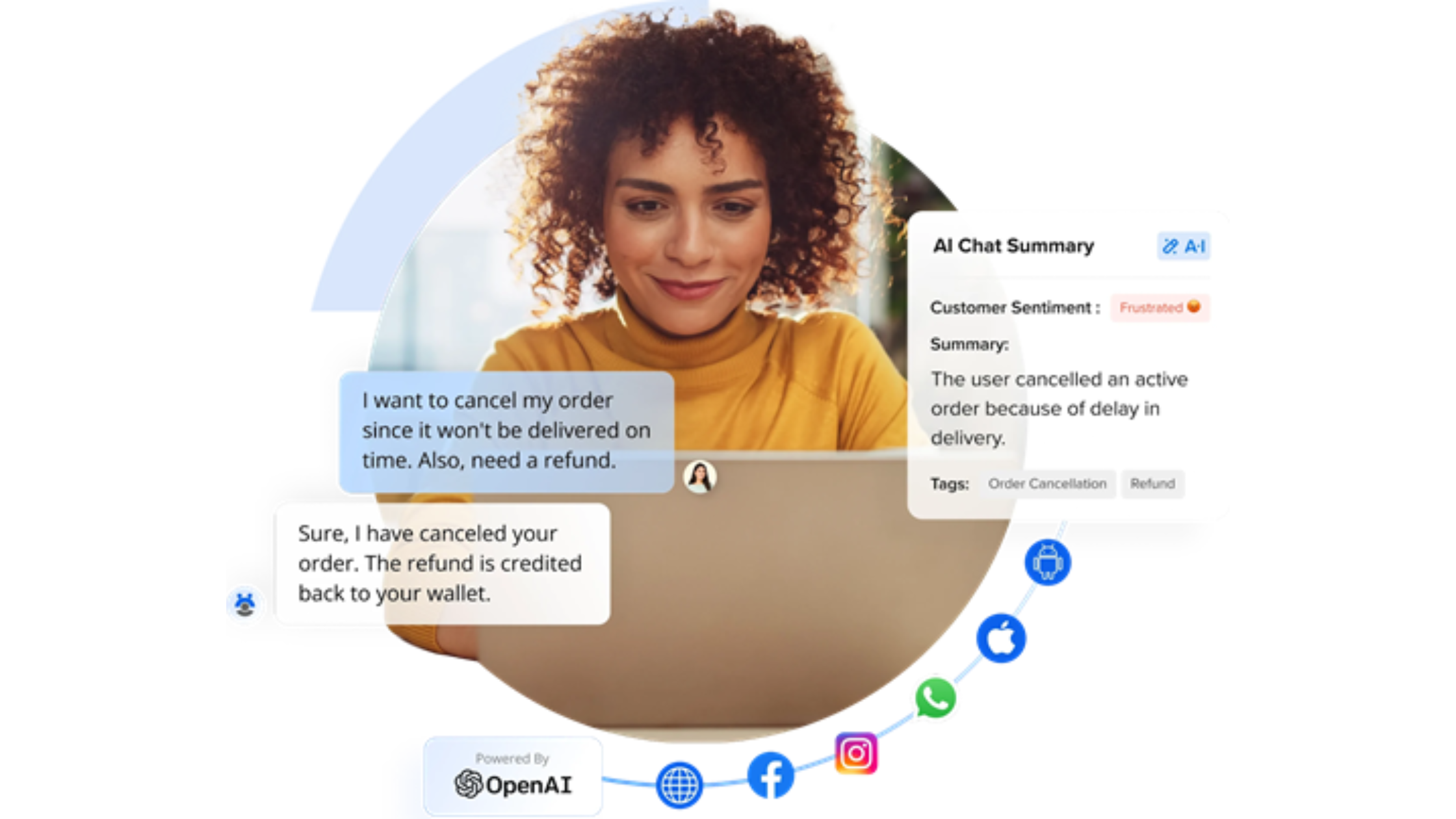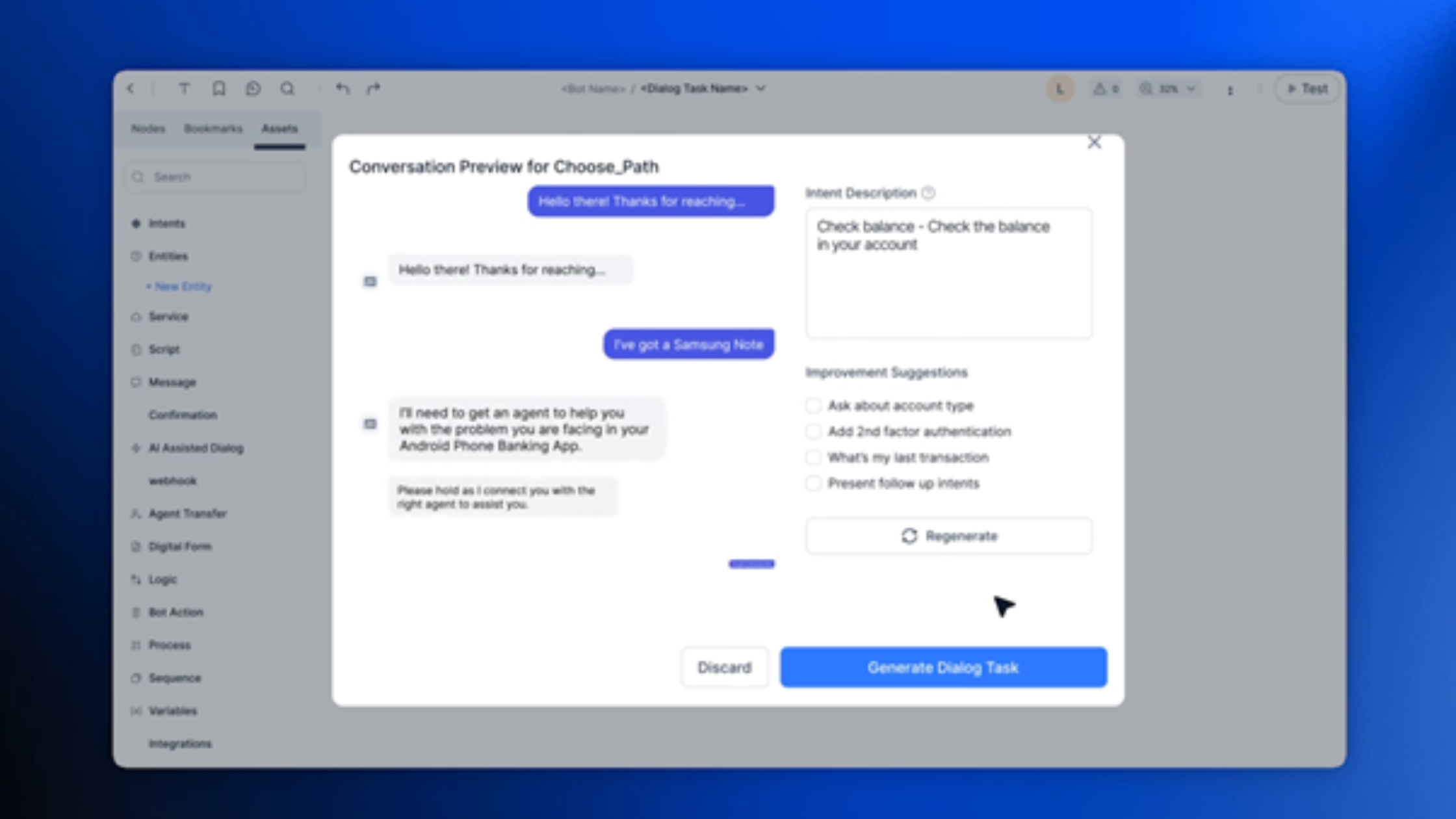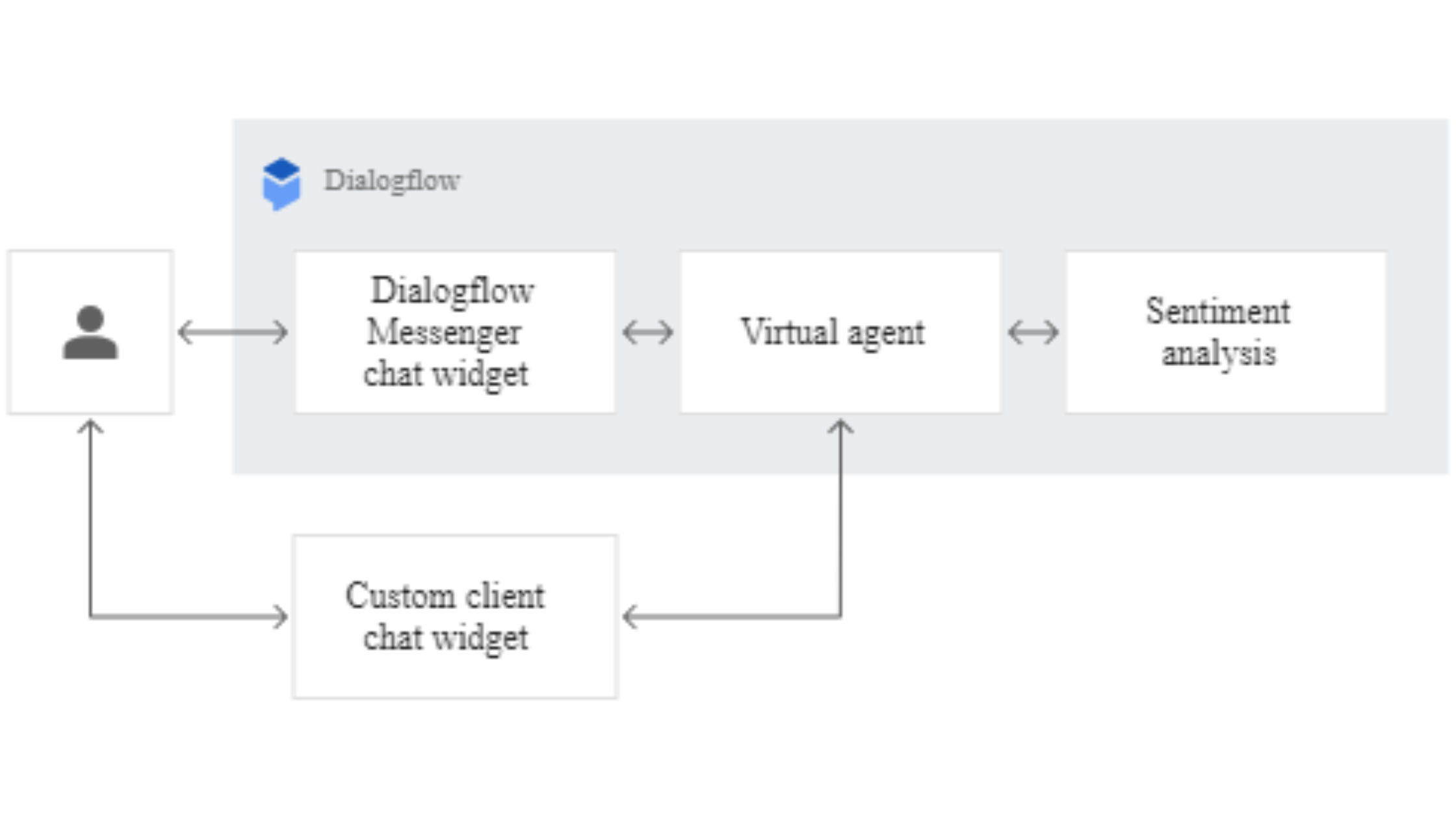MODIFIED ON: September 10, 2024 / ALIGNMINDS TECHNOLOGIES / 0 COMMENTS

A conversational AI platform is a software solution designed to enable the development, deployment, and management of conversational interfaces, such as chatbots, virtual assistants, and voice-enabled applications.
Let’s take a quick look at some of the best conversational AI platforms you can select for your organization:
IBM Watson Assistant

Credit: IBM Agent Assist
IBM Watson Assistant is an AI-powered virtual agent platform that enables businesses to build and deploy conversational interfaces across multiple channels. It offers advanced NLU capabilities, context management, integration with backend systems, and tools for training and improving the virtual assistant. IBM Watson Assistant stands out for its enterprise-grade features, including security, compliance, and scalability. It supports customization through APIs and SDKs, allowing developers to extend its functionality to meet specific business needs. One of the best parts is that IBM Watson Assistant offers a flexible pricing model based on usage, with free and paid plans available. Pricing is based on the number of messages processed or the level of support required.
The global conversational AI market was valued at $5.78 billion in 2020 and predicted $32.62 billion by 2030. Conversational AI, called chatbot technology, modernizes how businesses interact with customers. By automating interactions through chatbots, enterprises can provide 24/7 customer support, answer frequently asked questions, and personalize the customer experience. In this blog, we explore the top conversational AI platforms you can consider for your business to stay ahead of the curve.
What is conversational AI?
Conversational AI is a branch of Artificial Intelligence that allows machines to simulate conversations with humans. It utilizes a combination of natural language processing, machine learning, and speech recognition to understand and respond to user queries in a natural way.
Here’s a scenario to illustrate how conversational AI tackles a real-world problem:
Problem: Imagine you run a large e-commerce website. Your customer support team receives questions about product availability, order tracking, and return policies. Now, responding to these repetitive inquiries can be time-consuming and lead to longer wait times for customers having more complex issues.
Solution: Conversational AI can be implemented as a chatbot on your website. This chatbot can be trained on a massive dataset of customer queries and responses. This allows it to understand questions related to your products and services. When a customer interacts with the chatbot, it can leverage NLP to analyze their queries and provide relevant information.
Here’s how the conversation might play out:
Customer: “Hi, I’d like to track my recent order.”
Your Chatbot: “Absolutely! Can I have your order number?”
Customer: “Sure, it’s 12345.”
The chatbot can then access the order database and provide real-time tracking information. Additionally, it can answer frequently asked questions about returns, shipping policies, and product specifications. Research says that chatbots increase business sales by an average of 67%.
Advantages of Conversational AI
Helps stay on top of customer experience & engagement
More than 50% of customers want businesses to be available 24/7. Unlike human agents, conversational AI chatbots are available 24/7, 365 days a year. This ensures customers can get immediate answers to their queries, regardless of time zone or business hours. Chatbots can handle multiple inquiries, reducing wait times and frustrations for customers seeking assistance.
Did you know that 34% of retail customers are open to using chatbots for customer service? Conversational AI can leverage customer data and past interactions to personalize responses and recommendations. This creates a more engaging experience tailored to each customer’s needs. Another amazing thing about smart chatbots is that they can be programmed to understand and respond in multiple languages. This enables businesses to cater to a wider global audience and encourage inclusivity.
Optimize for automation and reduce expenses
Chatbots can handle routine tasks like answering FAQs, scheduling appointments, and processing simple transactions. This frees human agents to focus on complex customer issues and strategic initiatives. By automating tasks and deflecting simple inquiries from human agents, conversational AI can lead to significant cost savings in the long run.
Make accurate business decisions
Conversational AI collects valuable data from customer interactions, including queries, feedback, and buying behavior. This data can be used to gain deeper customer insights and identify areas for improvement. Smart chatbots analyze customer interactions and identify emerging trends and potential issues. This allows businesses to proactively address customer concerns and prevent problems before they escalate.
Top Conversational AI platforms to consider in 2024
Amazon Lex

Credit: Amazon Lex
Amazon Lex is a fully managed service for building conversational interfaces using voice and text. It leverages the same technology that powers Amazon Alexa, offering automatic speech recognition, natural language understanding, and integration with other AWS services. Amazon Lex benefits from AWS’s reliability, scalability, and security. It provides easy integration with other AWS services like Lambda, S3, and DynamoDB, allowing developers to build complex conversational workflows. The platform follows a pay-as-you-go pricing model, where you pay only for what you use, with no upfront fees or long-term commitments. Pricing is based on the number of text or voice requests processed.
Haptik

Credit : Haptik
Haptik is a leading conversational AI platform renowned for its robust features, seamless integrations, and user-friendly interface. With its advanced Natural Language Understanding engine, Haptik enables businesses to create chatbots and virtual assistants capable of understanding user intents, entities, and contexts across multiple languages and channels. Its omni-channel support ensures a consistent user experience across web chat, mobile apps, and messaging platforms like WhatsApp, Facebook Messenger, and SMS. This versatility allows businesses to engage with customers wherever they are, enhancing accessibility and convenience. Its intuitive interface and drag-and-drop tools empower non-technical users to design, train, and deploy chatbots with minimal coding knowledge.
Haptik offers a flexible model tailored to specific business needs. Pricing is typically based on factors such as the number of users, messages, and customizations required. Businesses can request customized quotes based on their unique use cases, ensuring they only pay for the resources they use. Additionally, Haptik may offer different pricing tiers or packages with varying levels of functionality, support, and service-level agreements (SLAs) to accommodate businesses of different sizes and budgets.
Kore. ai

Credit – Creating AI-Powered Virtual Assistants in Kore. ai
Kore.ai offers a comprehensive Virtual Assistant Platform. This platform empowers businesses to design, build, test, host, and deploy AI-powered virtual assistants across various channels like voice assistants, chatbots, and messaging applications. Kore.ai boasts industry-leading Natural Language Understanding capabilities, enabling its virtual assistants to understand complex user queries and respond accurately. The platform integrates seamlessly with over 35 digital and voice channels and supports over 100 languages, making it highly versatile for global enterprises. They likely offer a custom quote based on an organization’s specific needs and deployment scale. However, considering the platform’s enterprise focus and feature set, one can expect a tiered pricing structure catering to different business sizes and usage volumes. It’s recommended to contact Kore.ai directly for a tailored quote that aligns with your specific requirements.
Google Dialogflow

Credit – B2C Chatbots by Dialogflow
Dialogflow offers natural language understanding capabilities for building conversational interfaces such as chatbots and voice applications. It supports multiple platforms including web, mobile, messaging apps, and voice-enabled devices. Key features include entity recognition, intent detection, multi-language support, and integration with various backend systems. Google Dialogflow benefits from Google’s powerful machine learning algorithms, providing accurate language understanding and scalability. It offers a user-friendly interface with rich documentation and community support. Additionally, Dialogflow integrates seamlessly with other Google Cloud services and third-party platforms. It offers a free tier with usage limits and paid plans based on usage, starting from a reasonable rate per request. Pricing scales with usage and additional features like phone support and enterprise-level support are available in higher tiers.
Adopt AI hitch-free with Alignminds
AlignMinds serves as a trusted partner for businesses seeking to leverage the potential of artificial intelligence. Our dedicated team offers a comprehensive suite of consulting services, providing expert guidance every step of the way. From initial exploration to strategic planning and seamless implementation, we work closely with clients to tailor AI strategies that align perfectly with their unique goals and objectives. With AlignMinds by your side, you can confidently navigate the AI ecosystem and unlock new opportunities for innovation, growth, and success. Connect today.
Leave a reply
Your email address will not be published.
-
Recent Posts
- 9 Product Modernization Strategies for the AI Era
- How AI Development Transforms Product Modernization?
- The Impact of Generative AI on Low Code Platforms
- Generative AI: Transforming Cyber Threat Intelligence
- Top Steps for Optimizing Your Generative AI Model
-
Categories
- MVP Development (5)
- AlignMinds (55)
- Operating Systems (1)
- Android POS (3)
- Application Hosting (1)
- Artificial Intelligence (38)
- Big Data (2)
- Blockchain (1)
- Cloud Application Development (7)
- Software Development (32)
- Software Testing (9)
- Strategy & User Experience Design (4)
- Web Application Development (23)
- Cyber Security (6)
- Outsourcing (7)
- Programming Languages (3)
- DevOps (5)
- Software Designing (6)
- How to Code (4)
- Internet of Things (1)
- Machine Learning (2)
- Mobile App Marketing (4)
- Mobile Application Development (18)
- Mobile Applications (5)







